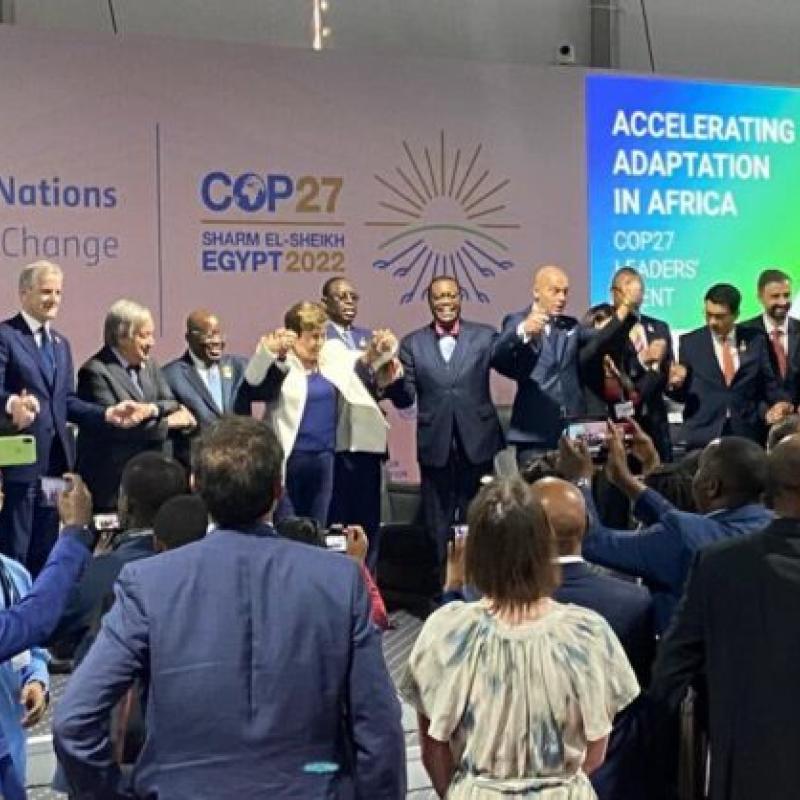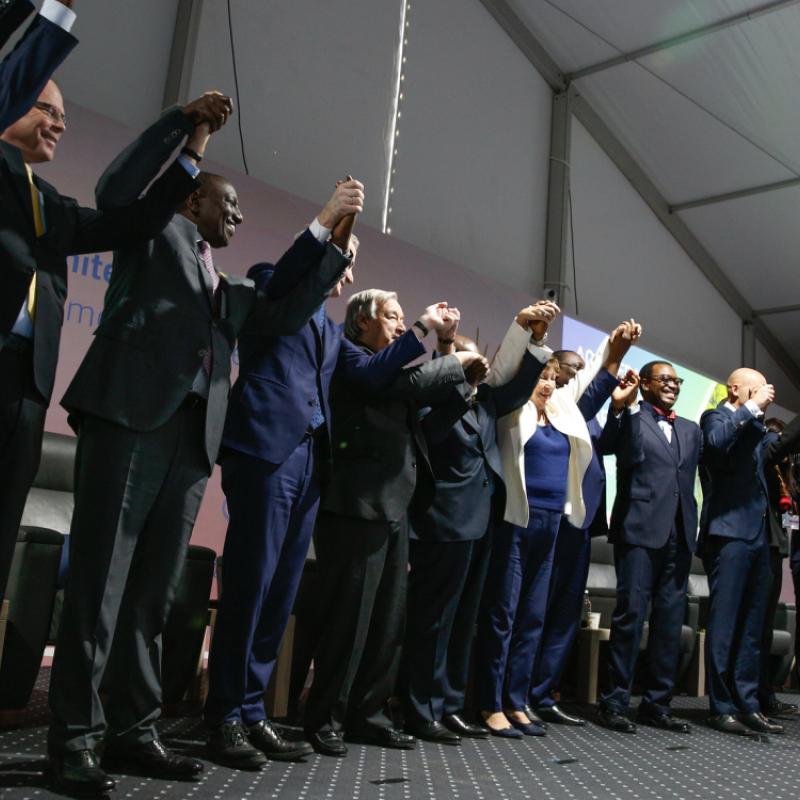
AAAP in the Media
Displaying 1 - 12 of 12
Can today’s Adaptation Action minimize future losses and damages in Africa?
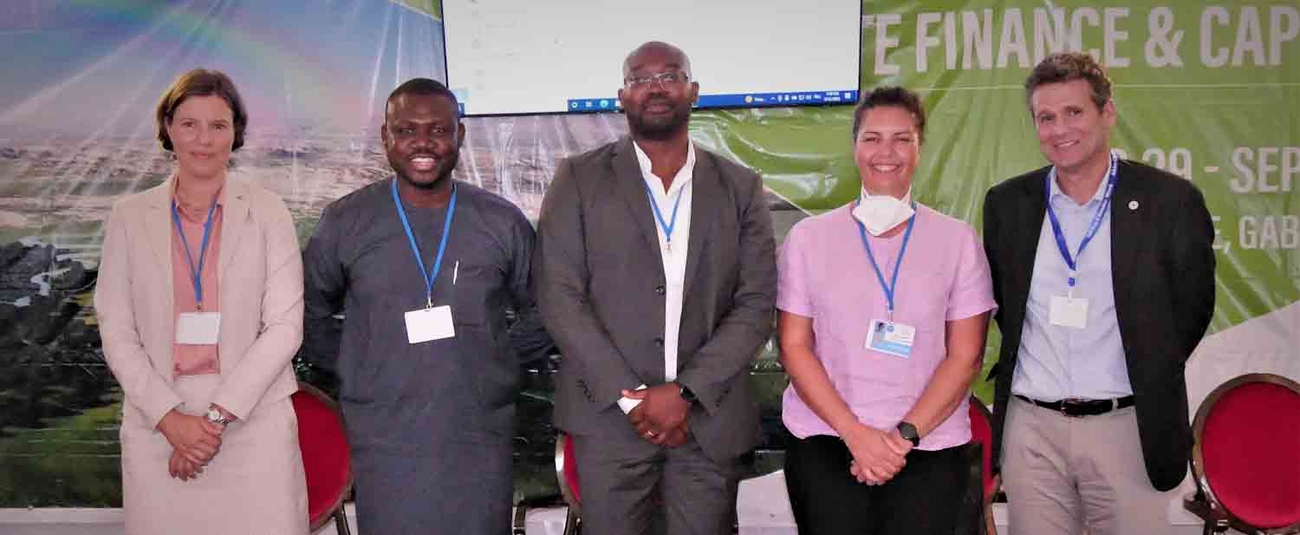
On the sidelines of the 2022 edition of Africa Climate Week(link is external), a session titled Limiting Loss and Damage through Enhanced Adaptation Action in Africa featured vibrant and timely discussion of an aspect of climate change that typically receives little attention: capturing and assessing the costs and damages associated with climate change.
The African Development Bank and Germany’s Konrad Adenauer Foundation hosted the event, which provided a forum for panelists and participants to discuss the importance of defining and evaluating such losses and damages of properties, economies, lives and livelihoods due to climate disasters. Africa is acknowledged to be the continent most vulnerable to climate change.
Moderator Olufunso Somorin, a Regional Principal Officer at the African Development Bank, opened the discussion. He pointed out that it is important for African countries to measure climate-change related loss and damage to enable appropriate quantification and well-designed responses best suited to country context. It was also important to capture those losses occurred even in instances where preventive climate adaptation actions had been taken, he added.
Fatten Agad, Africa Climate Foundation’s Senior Advisor on Climate Diplomacy and Geopolitics, called for production of a report that would serve as guidance and baseline for evaluating climate related losses and damage. “It has already been demonstrated that the socio-economic impact faced by African countries in coping with the Covid-19 crisis has been very high, and adding a burden of financing something such as loss and damage would be unfair,” she said.
Anja Beretta, Konrad Adenauer’s Director for Energy Security and Climate Change in Africa, urged African countries to integrate mechanisms to address losses and damage into their Nationally Determined Contributions (NDCs). She also called for designated institutions and functioning structures to ensure the efficient and effective use of climate finance to advance the discussion on financial flows into loss and damage.
Stephane Bonamy, Head of the Regional Delegation for the International Committee of the Red Cross in Cameroon, said, for countries that face both conflict and climate change impacts, it is imperative that preventive measures are put in place early enough to reduce the extent of loss and damage faced and lessen the burden on communities.” He noted that 14 of the 25 most vulnerable countries to climate change impacts worldwide also face some form of conflict.
Dr Olumide Abimbola, the Executive Director of the Africa Policy Research Institute in Berlin reiterated the need for more African examples of past and current loss and damage to be incorporated into textbooks and journals.
There was agreement among the participants on the need for Africa to prioritize timely, comprehensive and large-scale adaptation action to avert or minimize future losses and damages.
There was also consensus on the urgent need to scale up financial flows from public and private sources into adaptation action across Africa. They cited the African Development Bank’s Africa Adaptation Acceleration Program, a joint initiative with the Global Center on Adaptation, as a positive example. The program seeks to mobilize $25 billion over five years to accelerate and scale climate adaptation actions across the continent.
Participants also called for new strategic partnerships to drive adaptation policies, plans and investments in Africa through the implementation of NDCs and tapping synergies with such initiatives as the Africa Disaster Risk Financing program.
About the African Climate Week (ACW)
ACW is an annual event that engages and empowers stakeholders to drive climate action across countries, communities and economies. The event is organized by UN Climate Change in collaboration with global partners UN Development Programme, UN Environment Programme and the World Bank Group. Partners in the region include the Africa Union, the Africa Development Bank, the UN Economic Commission for Africa (UNECA). ACW 2022 was hosted in Gabon.
Africa Adaptation Dialogue: implementing the vision at the Africa Climate Week
What: Africa Adaptation Dialogue: implementing the vision
When: 31 August 09:30 - 10:30 CAT
Where: Libreville, Gabon
Who: Global Center on Adaptation; Africa Adaptation Initiative (Chaired by Gabon); African Development Bank
Despite contributing the least to global warming, Africa finds itself on the frontline of the climate emergency, with the impacts of external shocks exacerbating these vulnerabilities. Indeed, large portions of Africa—particularly the drylands that cover three-fifths of the continent—are warming at a rate twice the global average, putting half a billion people at risk.
Chaired by Gabon, the Africa Adaptation Initiative (AAI) aims to strengthen collaboration on adaptation across the continent. To implement this vision, the Global Center on Adaptation and the African Development Bank have jointly developed the Africa Adaptation Acceleration Program – AAAP. This Africa-led, Africa-owned response is mobilizing $25 billion for climate adaptation investments in the continent over five years. This event will review progress of the AAAP and how it is contributing to narrowing the finance gap, thus accelerating the implementation of AAI.
Program
- Welcome Remarks by the Moderator
Davinah Milenge Uwella – Principal Programme Coordinator, African Development Bank
- Opening Video
- Opening Remarks
Dr. Kevin Kariuki – Vice President, Power, Energy, Climate Change and Green Growth, AfDB
- Framing remarks: The Africa Adaptation Initiative and the AAA
Tanguy Gahouma-Bekale – Special Advisor to His Excellency Ali Bongo Ondimba, President of the Gabonese Republic, Permanent Secretary of the National Climate Council
- The AAAP as the vehicle to implement the AAI vision
Prof. Anthony Nyong – Senior Director, and Africa Regional Director, Global Center on Adaptation
AAAP voices from the field
- AAAP partners and beneficiaries
Moderated discussion with participants
- Wrap up by the Moderator
Multi-Stakeholder Dialogue on Climate Risk Assessment and adaptation options prioritization for the Transgabonaise road corridor PPP project
What: This is a private event
Where: Global - Virtual
When: 19 April 2023, 0:00
This first Multi-Stakeholder Climate Risk Dialogue will present the preliminary results of the high-resolution climate hazard modelling outcomes, and vulnerability assessment of the road corridor project.
Event description:
As part of the Global Center on Adaptation’s support to the Transgabonaise road corridor project under the Africa Adaptation Acceleration Program (AAAP), a Multi-Stakeholder Climate Risk Dialogue was organized to present results from the climate risk assessment with the African Development Bank, and project partners including the Societe Autiroutiere du Gabon (SAG), and the government of Gabon’s departments of Environment, Weather, and transport.
Historical weather trends, in Gabon, show an increase in mean annual temperatures of +1ºC since 1981, and decrease in mean annual rainfall, at an average rate of 3.8 mm per month per decade since 1960, with regional disparities. The technical assistance provided by the GCA will support an in-depth understanding of future climate hazards under different climate change scenarios, and across the different regions crossed by the 900km road corridor, and led to identify and provide a cost-benefit analysis of adaptation and resilience options to mitigate these current and future climate hazards.
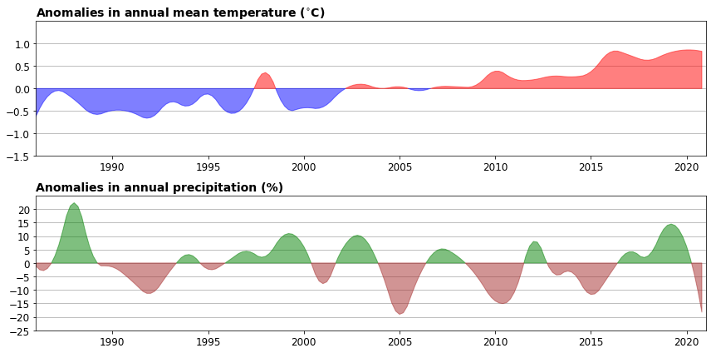
Figure 1: Climatology in Gabon: Historic evolution and trends, Source GCA – study from Royal Haskoning, Lobelia Earth, April 2023.
This First Multi-Stakeholder Climate Risk Dialogue will present the preliminary results of the high-resolution climate hazard modelling outcomes, and vulnerability assessment of the road corridor project. Especially, the project stakeholders will discuss the main climate hazards that have been highlighted, including extreme temperatures, extreme precipitation, drought intensity, and how these climate events might impact the assets and transport services. The discussion with local stakeholders will contribute to ensure robustness of the project outcomes.
Africa Adaptation Dialogue: implementing the vision
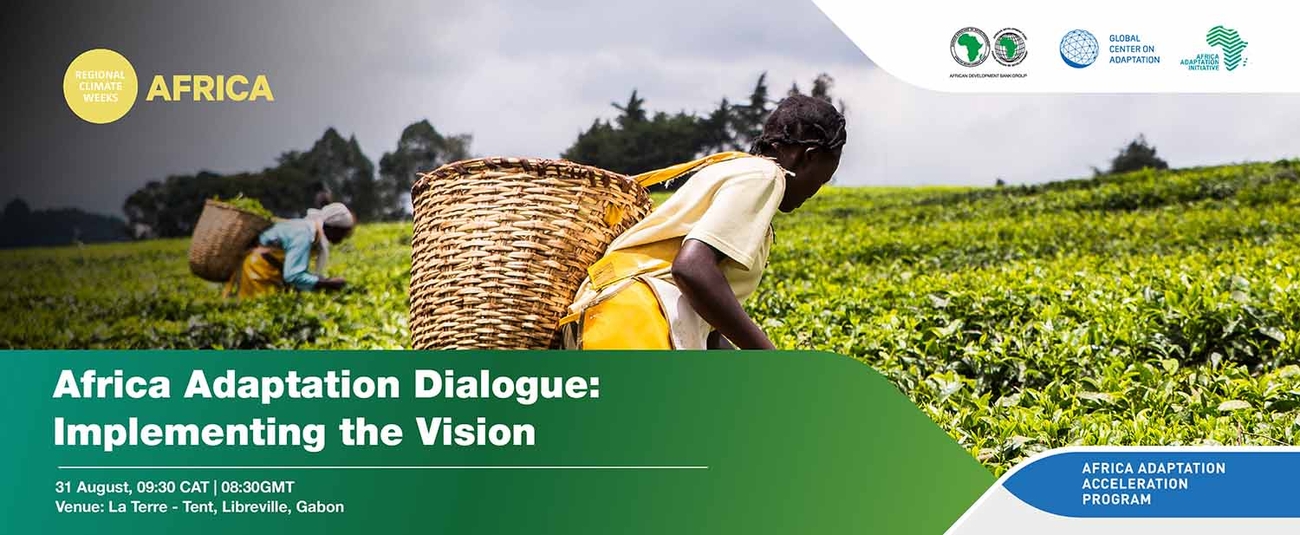
What: Africa Adaptation Dialogue: implementing the vision
When: 31 August 09:30 - 10:30 CAT
Where: Libreville, Gabon
Who: Global Center on Adaptation; Africa Adaptation Initiative (Chaired by Gabon); African Development Bank
Despite contributing the least to global warming, Africa finds itself on the frontline of the climate emergency, with the impacts of external shocks exacerbating these vulnerabilities. Indeed, large portions of Africa—particularly the drylands that cover three-fifths of the continent—are warming at a rate twice the global average, putting half a billion people at risk.
Chaired by Gabon, the Africa Adaptation Initiative (AAI) aims to strengthen collaboration on adaptation across the continent. To implement this vision, the Global Center on Adaptation and the African Development Bank have jointly developed the Africa Adaptation Acceleration Program – AAAP. This Africa-led, Africa-owned response is mobilizing $25 billion for climate adaptation investments in the continent over five years. This event will review progress of the AAAP and how it is contributing to narrowing the finance gap, thus accelerating the implementation of AAI.
Program
- Welcome Remarks by the Moderator
Davinah Milenge Uwella – Principal Programme Coordinator, African Development Bank
- Opening Video
- Opening Remarks
Dr. Kevin Kariuki – Vice President, Power, Energy, Climate Change and Green Growth, AfDB
- Framing remarks: The Africa Adaptation Initiative and the AAA
Tanguy Gahouma-Bekale – Special Advisor to His Excellency Ali Bongo Ondimba, President of the Gabonese Republic, Permanent Secretary of the National Climate Council
- The AAAP as the vehicle to implement the AAI vision
Prof. Anthony Nyong – Senior Director, and Africa Regional Director, Global Center on Adaptation
AAAP voices from the field
- AAAP partners and beneficiaries
Moderated discussion with participants
- Wrap up by the Moderator
Gabon –The Transgabonaise Road Project
With improvements to the road, rail, shipping and aviation networks a key government goal, Gabon’s transport sector is undergoing a major transformation. While population pressure is modest, with around 1.7m people in the country, existing links are limited; the two largest cities, Libreville and Port-Gentil, had, until work began on one recently, no road connection.
The 828 km long Transgabonaise road is key as it connects Libreville (the capital and coastal city) and Franceville (third Gabonese city after Port-Gentil). It comprises several segments of the Routes Nationales (RN) 1 to 4. Despite its strategic importance, the road has suffered from substantial deterioration due to a lack of maintenance and increased traffic over the last decade, caused by the increase of population and lumbering.
The projects is supporting the rehabilitation of a succession of national roads in Gabon to make it a more efficient logistics axis.
Transgabonaise Road Project is divided into three stages:
- Libreville -AlembéStage
- Alembé -Mikouyi (via Lalara, Koumameyong, Booué, Carrefour Leroy)
- Mikouyi -Franceville
- High-resolution, asset-level climate risk and vulnerability assessments to quantify key climate hazards and associated risks to the road infrastructure assets along the entire road corridor
- Innovative solutions for climate smart transport asset management: Based on specific hazards identified including nature-based solutions (NBS) to optimize the resilience of the assets
- Operational performance metrics and standards for the service level agreement (SLA) based on the direct and indirect climate-related damages identified
- Improvement in the capacity and quality of the road infrastructure
- Creation of over 1,000 direct jobs and over 9,000 indirect jobs
- Saving on operational costs and travel time impacting both households and private sector development though lower transport costs
- Generation of safety benefits and lower greenhouse gas emissions
- Additional 200 billion CFA (or $302.4 million) to Gabon’s GDP (equivalent to ~1.9% according to the 2021 GDP)
- Increased connectivity within Gabon and with neighboring countries such as Cameroon, Equatorial Guinea and Congo-Brazzaville
- Promote economic growth through ease of transportation of goods and services efficiently, allowing businesses to access larger markets and expand their operations
- increased trade, investment, and tourism, stimulating economic development in both urban and rural areas in Gabon
- Enhances regional integration and cooperation by facilitating the movement of people, goods, and services across borders, fostering trade relationships and cultural exchange
- Improve accessibility to remote areas, providing people with better opportunities for education, healthcare, employment, and social services
USD 99.2 million
Global Leaders Rally Support and Finance for the Africa Adaptation Acceleration Program to Tackle Climate Change in Africa
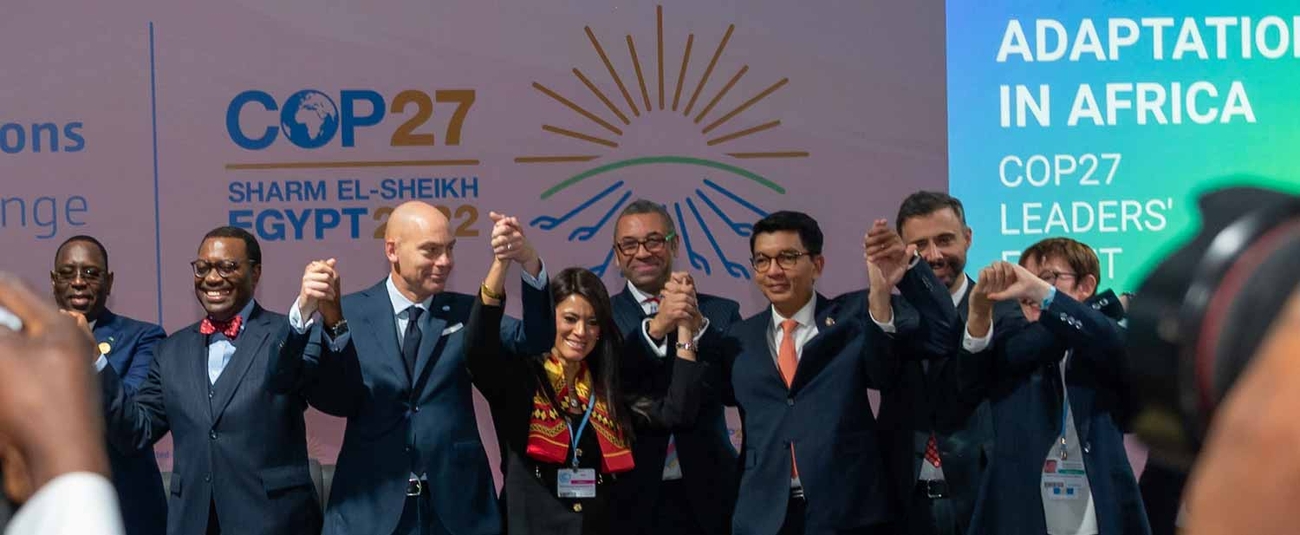
Global leaders on Tuesday rallied around climate adaptation for Africa. They attended the Africa Adaptation Leaders’ Event, convened by African Union Chair President Macky Sall of Senegal, Global Center on Adaptation CEO Patrick Verkooijen, and African Development Bank Group President Akinwumi Adesina.
The event took place at the global climate summit (COP27) in Sharm El-Sheikh, Egypt. It underscored the critical need for climate adaptation in Africa and responded to the call for the capitalization of the Africa Adaptation Acceleration Program (AAAP).
“This is a pivotal step in the fight against climate change,” African Union Chair President Macky Sall said. “The commitments made by Africa’s partners will give the Africa Adaptation Acceleration Program the boost that it needs to transform the development trajectory of the world’s most climate exposed continent. I am confident in the ability of the AAAP to deliver results for Africa.”
The Africa Adaptation Acceleration Program is an Africa-owned and Africa-led initiative developed by the Global Center on Adaptation (GCA) and the African Development Bank (AfDB) in close collaboration with the African Union. It serves as the implementation of the Africa Adaptation Initiative (AAI) to mobilize $25 billion to implement, scale and accelerate climate adaptation across the Africa. Since 2021, AAAP has mainstreamed climate adaptation in over$3.5 billion of investments in 19 countries.
United Nations Secretary-General António Guterres said: “I want to express my total solidarity for the Africa Adaptation Acceleration Program […] I urge the international community to support Africa to mobilize the technical & financial resources for scaling up transformative adaptation.”
“With this innovative program, Africa has developed a plan to grow, create jobs and opportunities for people, and to be resilient against the climate crisis,” said President Akufo-Addo of Ghana. “AAAP’s singular focus on the issue of climate adaptation will also contribute to greater stability and progress in Africa and around the world. AAAP is aligned with Ghana’s plans to address climate change as it chairs the Climate Vulnerability Forum (CVF) to lead efforts from the world’s most climate vulnerable countries to spur and mobilize investment through the Climate Prosperity Plans."
James Cleverly, Secretary of State for Foreign, Commonwealth and Development Affairs of the United Kingdom announced that the UK will provide £200 million to the African Development Bank’s Climate Action Window. This is in addition to the £20 million announced at COP26 in Glasgow to the AAAP Upstream Financing Facility.
Cleverly noted: “Climate change is having a devastating impact on countries in Sub-Saharan Africa facing drought and extreme weather patterns, which have historically received a tiny proportion of climate finance. This new mechanism […] will see vital funds delivered to those most affected by the impacts of climate change, much more quickly.”
Prime Minister Mark Rutte of the Netherlands followed through on the commitment made at the Africa Adaptation Summit held at the Global Center on Adaptation in September to confirm that the Netherlands will contribute EUR110 million to the AAAP, with EUR10 million in support for the Upstream Financing Facility hosted by GCA and EUR 100 million for the Climate Action Window of the African Development Fund at the African Development Bank as part of the Netherlands’ commitment to dedicate half of its climate funding, fully grant based, to climate adaptation, with a focus on Africa.
Norwegian Prime Minister Jonas Gahr Støre echoed African leaders’ calls for countries to rapidly scale up finance for climate adaptation, stating: “The climate crisis is here and now. Years of progress are at risk.”
“The AAAP Upstream Financing Facility is the delivery mechanism of adaptation and will use millions to leverage the billions that is required for adaptation,” he continued. “AAAP projects will generate effective climate adaptation outcomes. Adaptation is a growth agenda. A jobs agenda. And a prosperity agenda. On behalf of Norway, I am looking forward to continuing this partnership, investing in it, and supporting it with the Global Center on Adaptation.”
International Monetary Fund Managing Director Kristalina Georgieva emphasized the need to accelerate adaptation in Africa, stating: “It is paramount to support Africa’s adaptation because Africa will not reach its tremendous potential without it. AAAP complements the IMF’s Resilience and Sustainability Trust, which helps countries address external shocks such as climate change and ensure sustainable growth that can give Africa a chance to leapfrog outdated development models.”
African Development Bank Group President Dr. Akinwumi Adesina said: “Africa is suffering from the devastating effects of climate change. Our continent is being short changed by climate finance. The contributions towards the Africa Adaptation Acceleration Program’s Upstream Financing Facility and the Climate Action Window – which the African Development Bank manages – will help capitalize the program. With increased capital, we can better deliver the investment needed to bridge the adaptation finance gap. We want to ensure that the most vulnerable communities can benefit from a sustainable and prosperous future.”
Endorsing the outcomes of the high-level meeting, Patrick Verkooijen, CEO of the Global Center on Adaptation, closed with a statement emphasizing the AAAP’s impact to date, noting that “there is no pause button on the climate crisis. Africa must adapt to the threat of climate change, and it must adapt now.”
“Through the AAAP,” he continued, “Africa has charted its path towards a climate-resilient future for its youth, its economic growth, and for its prosperity.”
About the Global Center on Adaptation
The Global Center on Adaptation (GCA) is an international organization which works as a solutions broker to accelerate action and support for adaptation solutions, from the international to the local, in partnership with the public and private sector, to ensure we learn from each other and work together for a climate-resilient future. Founded in 2018, GCA is hosted by the Netherlands, working from its headquarters in Rotterdam with a knowledge and research hub based in Groningen. GCA has a worldwide network of regional offices in Abidjan, Côte d’Ivoire, Dhaka, Bangladesh and Beijing, China. Through this evolving network of offices and global and regional GCA teams, the organization engages in high-level policy activities, new research contributions, communications, and technical assistance to governments and the private sector.
About the African Development Bank
The African Development Bank Group is Africa’s premier development organization. Its overarching objective is to spur sustainable economic development and social progress in its regional member countries, thus contributing to poverty reduction across the continent.
The Bank Group achieves this objective by mobilizing and allocating resources for investment in African countries and providing policy advice and technical assistance to support development efforts.
In 2015, all multilateral development institutions agreed on the same set of objectives, the United Nations Sustainable Development Goals.
Learn more: https://www.afdb.org/
About the Africa Adaptation Acceleration Program
The Africa Adaptation Acceleration Program (AAAP) is a joint initiative of the African Development Bank and the Global Center on Adaptation (GCA). It aims to mobilize $25 billion, over five years, to accelerate and scale climate adaptation action across the continent. This ambition is delivered through the AAAP Upstream Financing Facility managed by the Global Center on Adaptation and the African Development Bank’s climate action window in the ADF replenishment. AAAP works across four pillars to achieve transformational results: Climate-Smart Digital Technologies for Agriculture and Food Security; African Infrastructure Resilience Accelerator; Youth Empowerment for Entrepreneurship and Job Creation in Climate Adaptation and Resilience and Innovative Financial Initiatives for Africa. AAAP has already guided over $3.5 billion of upstream investments in 19 countries with every dollar spent influencing $100 downstream.
COP27 - COP27 Leaders' Event, Accelerating Adaptation in Africa (DAY 2)
COP26 Leaders’ Event – Africa Adaptation Acceleration Summit
What: COP26 Leaders’ Event – Africa Adaptation Acceleration Summit
Where: Meeting room 4, Zone F (in front of plenary rooms)/ also available on livestream here: https://bit.ly/31nTtIW
When: 14:15-15:45 on Tuesday 2nd November
Followed by press conference
When: 16:00-16:30
Where: Press Conference Room Durdle Door, Area D - Ground Floor
The future of Africa depends on global action and firm resource commitments to support climate adaptation. The recent IPCCC report highlighted the continent is the most vulnerable to climate change. The Africa Adaptation Acceleration Summit is the moment at COP26 for African heads of state and government to outline how they are ready to play their part to build resilience across the continent. They will outline the commitments made and the actions required by global partners for a sustainable future.
Confirmed speakers
Host’s Keynote address
Félix Tshisekedi, President of the Democratic Republic of Congo and Chair of the African Union
Keynotes
- António Guterres, Secretary-General of the United Nations
- Bill Gates, co-Chair of the Bill & Melinda Gates Foundation
- Akinwumi Adesina, President of the African Development Bank Group
- Antony Blinken, U.S. Secretary of State
- Kristalina Georgieva, Managing Director of the International Monetary Fund
- Ngozi Okonjo-Iweala, Director-General of the World Trade Organization
- Alok Sharma, President for COP26
Leaders’ interventions
- João Lourenço, President of Angola
- Mokgweetsi Masisi, President of Botswana
- Évariste Ndayishimiye, President of Burundi
- Jorge Carlos Fonseca, President of Cape Verde
- Faustin-Archange Touadéra, President of Central African Republic
- Azali Assoumani, President of Comoros
- Adama Barrow, President of Gambia
- Nana Akufo-Addo, President of Ghana
- Umaro Mokhtar Embaló, President of Guinea Bissau
- Uhuru Kenyatta, President of Kenya
- Andry Rajoelina, President of Madagascar
- Lazarus Chakwera, President of Malawi
- Filipe Nyusi, President of Mozambique
- Mohamed Bazoum, President of Niger
- Muhammadu Buhari, President of Nigeria
- Paul Kagame, President of Rwanda
- Wavel Ramkalawan, President of Seychelles
- Julius Maada Bio, President of Sierra Leone
- Samia Suluhu Hassan, President of Tanzania
- Faure Gnassingbé, President of Togo
Moderation
Patrick Verkooijen, CEO of Global Center on Adaptation
COP27: UK triples its pledges for Africa’s climate adaptation projects
Millions pledged at Africa adaptation acceleration event
African, other world leaders gather for largest summit on climate adaptation at COP26
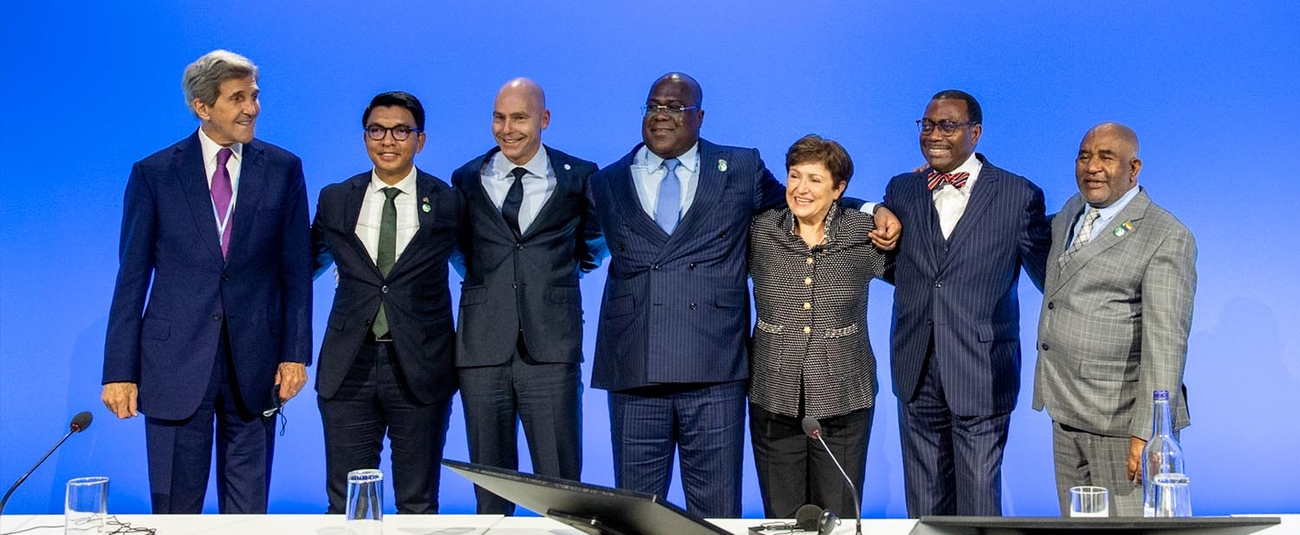
African and other global leaders came together at COP26 in Glasgow yesterday for the Africa Adaptation Acceleration Summit, the largest summit to date on climate adaptation.
The summit called for the rest of the world to ramp up its support for the African continent as it adapts to the adverse effects of climate change, including devastating human impacts in Madagascar, where 1.3 million people live under food distress following four years of no rain. Madagascar’s situation has been described as the first climate induced drought.
President Félix Tshisekedi of the Democratic Republic of Congo and Chairperson of the African Union led Tuesday’s event. He highlighted the $6 billion in financial commitments for climate adaptation that African countries had put forward in their nationally determined contributions (NDCs) and called for increased funding to produce the additional $27 billion a year that the continent requires.
President Tshisekedi said: “Adaptation finance flowing to Africa is grossly insufficient compared to the enormous resources needed for the continent to adapt to climate change. That is why African countries, working with the Global Center on Adaptation, the African Development Bank, and other partners, launched the Africa Adaptation Acceleration Program (AAAP). The program lies at the heart of Africa’s climate change needs. It is Africa-owned and Africa-led. African nations have endorsed it as Africa’s preferred mechanism to deploy adaptation finance for adaptation projects in Africa.”
African Development Bank Group President Dr Akinwumi A. Adesina said: “The Africa Adaptation Acceleration Program is a game changer for Africa to deliver results and impacts on adaptation, fast and at scale. It will support 30 million farmers with digital climate advisory services. The Technologies for African Agricultural Transformation program supported by the African Development Bank and the Bill and Melinda Gates Foundation has already delivered climate resilient technologies for 11.2 million farmers in just two years.”
He added: “With the Africa Adaptation Acceleration Program, we expect to reach 40 million farmers. We plan to support farmers in producing 100 million metric tons of food, which will be enough to feed 200 million people and reduce hunger by 80%.”
Moderating summit proceedings, Patrick Verkooijen, CEO of the Global Center on Adaptation, underscored the urgent need for accelerated climate adaptation action across the continent: “COP26 must deliver on the promises of Paris,” he said. “We are failing and we are failing Africa. We must bring more ambition and more finance to help Africa adapt to the pace of a climate emergency devastating the continent with increasingly serious consequences for the world’s poorest and most vulnerable,” the GCA CEO added.
COP26 President Alok Sharma announced $197 million in new funding for adaptation for Africa from the UK government. Of this amount, $27 million will support the Africa Adaptation Accelerated Program upstream facility to deliver technical assistance and a pipeline of bankable projects. The package is expected to unlock almost $1.2 billion for climate adaptation in Africa. Sharma said there will be more to come.
US Secretary of State Antony Blinken also announced new funding for climate adaptation from the United States government. He said the US President would work with the US Congress to dedicate $3 billion annually in adaptation finance by the year 2024. This is the largest commitment ever made by the US to reduce the impact of climate change in those most endangered by it around the world.
Global and African Leaders Welcome Launch of GCA Africa as “Historic Moment to Accelerate Adaptation” on the Continent
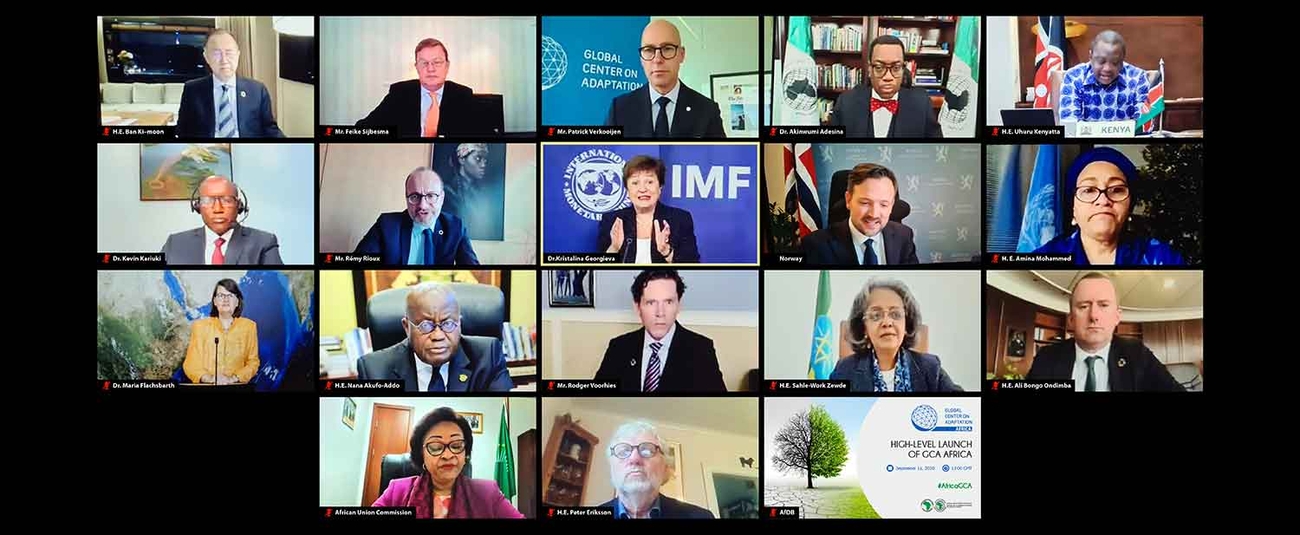
The Global Center on Adaptation today announced the launch of its regional office in Côte d’Ivoire.
Hosted by the African Development Bank at its headquarters in the Ivorian capital Abidjan, GCA Africa will work with partners across the continent to scale and accelerate adaptation action that protects African communities from the impacts of climate change.
GCA Africa will focus on programs and action, knowledge acceleration and capacity building and agenda-setting that respond to the acute challenges from the changing climate facing African countries.
The GCA Africa programs include improving the food security of one billion people in Sub-Saharan Africa by 2030 through a program on rural well-being and food security, as well as projects to support communities through water for urban growth and resilience; using nature for more resilient infrastructure; adaptation finance and building youth leadership.
Commenting on the launch, Ban Ki-moon, Co-Chair of the Board of the Global Center on Adaptation and 8th Secretary-General of the United Nations said:
“This is a historic moment to accelerate adaptation in Africa. Nowhere is the challenge of achieving sustainable development in the face of a changing climate more acute. Our new regional office will support regional and national adaptation efforts by emphasizing and spreading existing best practices on the continent and ensuring their fully fledged integration into broader international adaptation efforts”.
Dr. Akinwumi Adesina, President of the African Development Bank said:
“I am delighted with the launch today of the Global Center on Adaptation for Africa (GCA) hosted by the African Development Bank. The Bank has committed to doubling its financing for climate to $25 billion by 2025, with over 50% devoted to climate adaptation. Africa must not be short-changed by global climate finance. We will partner with the GCA to mobilize more resources for climate adaptation in Africa.”
Ali Bongo Ondimba, President of Gabon and Chair of the African Adaptation Initiative said:
“The devastating effects of climate change, which include severe droughts, floods, reduced agricultural yields, sea-level rise, and other climate-related disasters, are on the rise. The launch of GCA Africa is a bold and innovative initiative to galvanize the support needed to significantly scale up adaptation on the continent, identify gaps and connect regional partners to find solutions.”
Quotes from other partners:
Kristalina Georgieva, Managing Director, International Monetary Fund said:
“More than any other region, sub-Saharan Africa is vulnerable to the impact of climate change, which threatens lives and livelihoods and undermines economic growth. After the current crisis, boosting resilience is an urgent priority so it’s vital we share the knowledge and best practice that can help accelerate climate adaptation.”
Amina J. Mohammed, Deputy Secretary General of the United Nations said:
“There is an urgent need to step up the support for people in Africa, and around the world, affected by climate change. I welcome the Global Center on Adaptation Africa as a crucial partner in delivering the elevated ambition and enhanced action that is needed to make this shift towards a resilient future.”
Feike Sijbesma, Co-Chair of the Board of the Global Center on Adaptation and Honorary Chairman of Royal DSM said:
“Millions of lives depend on Africa’s agricultural sector. Adapting and improving its resilience to climate change is therefore a must. By investing in African local food systems we catalyze sustainable value chains and support the vulnerable but small-scale often female producers.”
Nana Akufo-Addo, President of Ghana said:
“Adaptation to the impact of our changing climate is essential if Ghana is to continue to grow and prosper. We look forward to working with GCA and its partners to meet the challenge of climate change and ensuring resilience is built into Africa’s economic recovery plans.”
Dag-Inge Ulstein, Minister of International Development for Norway said:
“Climate change is not only damaging for the environment, but devastating also for development. It is important that countries around the world, especially our partners in Africa, work together to address these global challenges. Norway is pleased to be able to support GCA Africa in accelerating this agenda.”
Peter Eriksson, Minister for International Development Cooperation for Sweden said:
“GCA is a key solutions broker and center of excellence with a holistic approach that aims to accelerate adaptation solutions for a climate-resilient future in Africa. By working with GCA Africa we will intensify climate adaptation efforts to ensure we integrate solutions to have a coherent response to our climate emergency.”
Patrick Verkooijen, CEO of the Global Center on Adaptation said:
“The impacts of climate change are already being felt across Africa and will only increase in magnitude. Adaptation is not a nice-to-have, it’s a necessity. Through our role as a solutions broker, GCA Africa will work closely with partners in every sector to ensure the most effective adaptation measures are shared and scaled across the continent, responding to the growing demand for strengthening resilience to the impacts of our changing climate.”
The launch of GCA Africa comes shortly after the launch of its South Asian office in Dhaka by Prime Minister Sheikh Hasina in September 2020. Its first regional office was launched in Beijing by Premier Li Keqiang in June 2019.
In May 2020, GCA Africa published a GCA policy brief(link is external), with the African Adaptation Initiative and endorsed by 54 Heads of State and Government, which recommended focusing stimulus investment in Africa on resilient infrastructure and food security to overcome the COVID-climate crisis.
The GCA is the lead partner institution for the Climate Adaptation Summit in the Netherlands – the first major gathering of international leaders dedicated entirely to adaptation. The summit takes place on 25 January 2021 and is hosted by Prime Minister Mark Rutte of the Netherlands. The GCA is also the Managing Partner to the Climate Vulnerable Forum and Vulnerable Twenty (V20) Group of Ministers of Finance, a group of 48 developing countries highly vulnerable to climate change.
Watch the launch at the following links:
About the Global Center on Adaptation
The Global Center on Adaptation (GCA) is an international organization which works as a solutions broker to accelerate action and support for adaptation solutions, from the international to the local, in partnership with the public and private sector, to ensure we learn from each other and work together for a climate resilient future. Founded in 2018, the GCA is hosted by the Netherlands. Through an evolving network of offices and global and regional GCA teams including a global innovation hub for climate adaptation launched by Premier Li Keqiang in Beijing, the organization engages in high-level policy activities, new research contributions, communications, and technical assistance to governments and the private sector.

